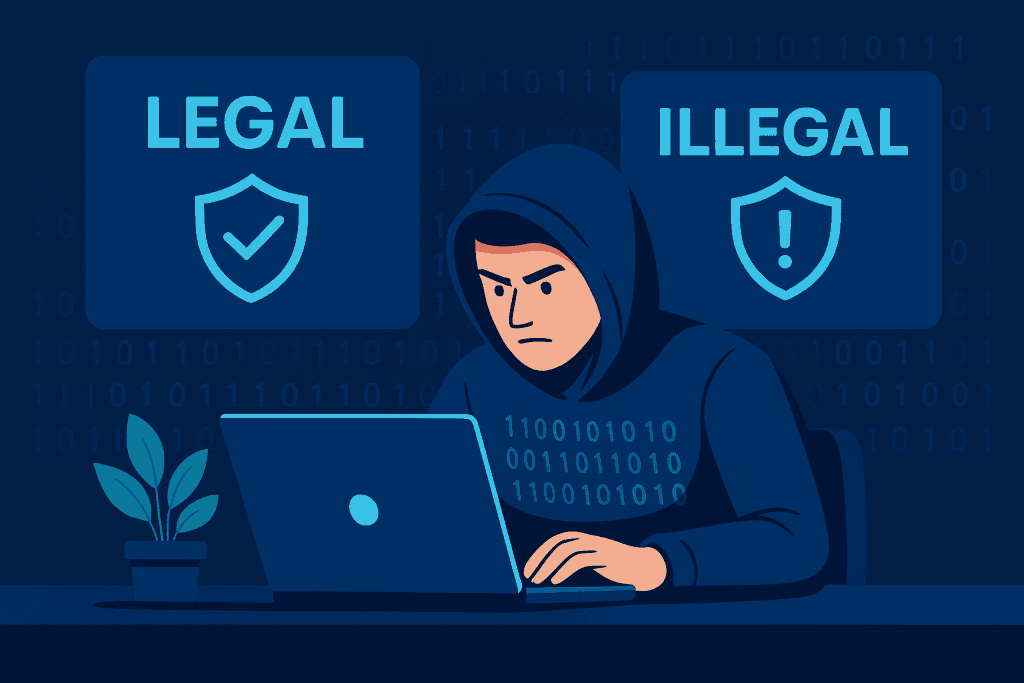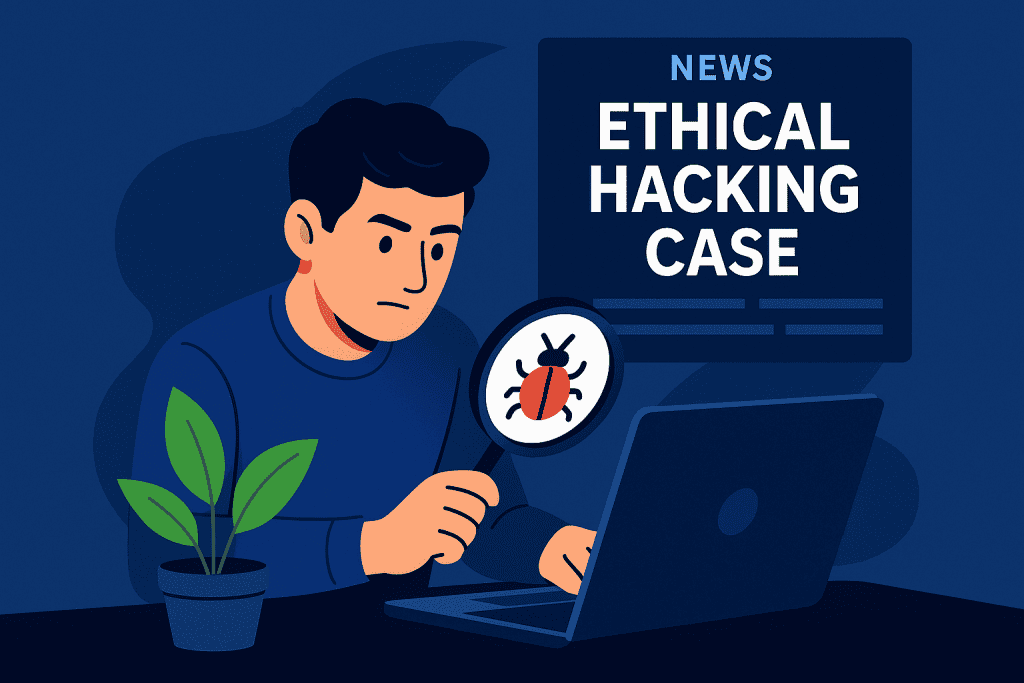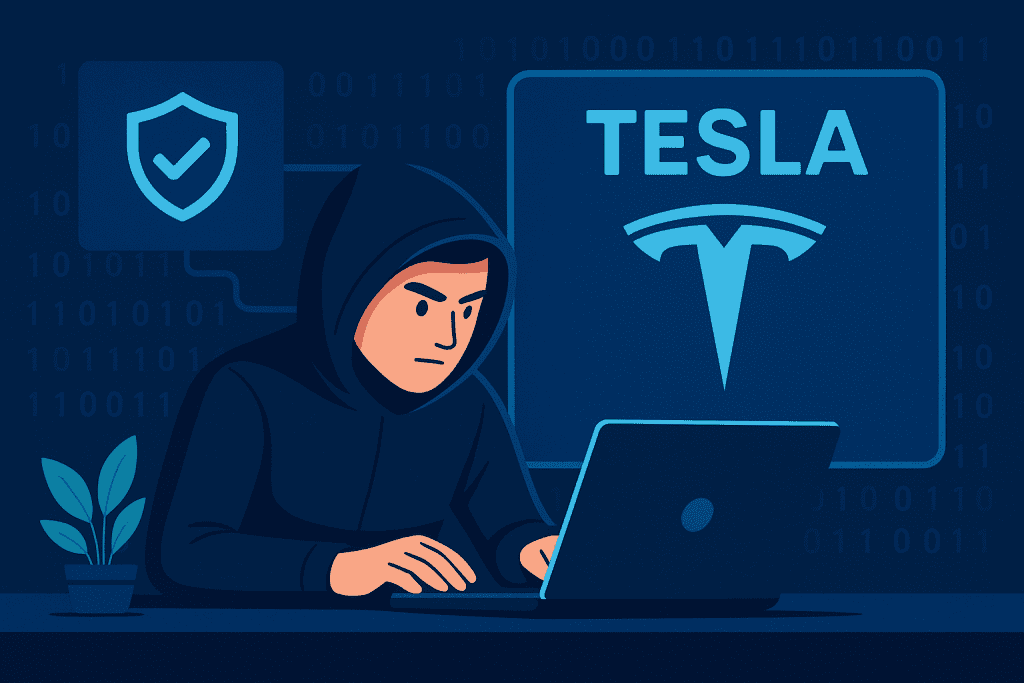Imagine this: You’re a brilliant coder with the power to break into systems, uncover hidden vulnerabilities, and even prevent cyberattacks before they happen. Sounds like something out of a Hollywood thriller, right? Well, welcome to the world of ethical hacking—a field where hackers use their skills for good, helping companies and governments strengthen their security.
But here’s the catch: not all hacking is legal, and the fine line between ethical and illegal activities can sometimes blur. One wrong move and an ethical hacker could find themselves on the wrong side of the law. So, what defines ethical hacking, and where do we draw the line between good and bad hacking? Let’s break it down.

The Fine Line: Legal vs. Illegal Hacking
Hacking, by definition, means gaining access to a system—sometimes without permission. Ethical hackers, however, are granted explicit authorization to test security defenses. Companies hire them to find weaknesses before malicious hackers do. But here’s where things get tricky: if an ethical hacker tests a system without prior approval, even with good intentions, it’s still considered a crime.
The Marcus Hutchins Case

A famous example is Marcus Hutchins, a cybersecurity researcher who helped stop the WannaCry ransomware attack. Despite his contributions, he was arrested for his involvement in creating earlier malware. His case sparked debate: should past mistakes define an ethical hacker, or should their contributions be what matters most?
Laws vary across countries, but in most cases, unauthorized access—no matter the intent—is illegal. Governments worldwide have implemented laws like the Computer Fraud and Abuse Act (CFAA) in the U.S. and the UK’s Computer Misuse Act to regulate hacking activities. However, these laws often struggle to keep up with the fast-paced evolution of technology and cybercrime.
Why Ethical Hacking Matters in Cybersecurity
With cyber threats growing more advanced, ethical hackers are crucial in the fight against cybercrime. Their role is to anticipate attacks, patch vulnerabilities, and ensure that companies are not easy targets for malicious actors.
The Rising Cost of Cybercrime
Consider this: in 2023, cyberattacks cost businesses an estimated $8 trillion globally, and experts predict this number will only rise. From phishing scams to ransomware attacks, cybercriminals are constantly innovating new ways to exploit weak systems. This is where ethical hackers step in.
- Penetration testing: Ethical hackers simulate cyberattacks to identify security loopholes.
- Red teaming: They act as real attackers to test an organization’s defenses.
- Bug bounty programs: Companies like Google and Facebook pay hackers to find and report vulnerabilities before they’re exploited.
Ethical hacking isn’t just about testing corporate systems. It’s also about protecting individuals. Have you ever received a scam email asking for personal details? Ethical hackers work behind the scenes to shut down phishing operations and keep personal data safe.
For a deeper dive into ethical hacking, check out this informative video:
The Debate: Should Ethical Hackers Have More Freedom?
As cybercrime becomes more sophisticated, some experts argue that ethical hackers should have more freedom to operate without prior consent. Their reasoning? Many of the biggest security flaws in history were discovered by hackers who technically broke the law but acted in the interest of public safety.
The Tesla Hacking Challenge

Tesla, known for its cutting-edge technology, actively encourages hackers to break into its systems—legally, of course. Through its annual hacking challenge, the company offers substantial rewards to hackers who discover vulnerabilities. In 2023, a hacker successfully exploited Tesla’s infotainment system, revealing security weaknesses that could have been a goldmine for cybercriminals. Instead of being penalized, the hacker was rewarded.
This approach raises an interesting question: should more companies follow Tesla’s lead and create structured programs that encourage ethical hacking?
On the flip side, critics worry that granting hackers too much freedom could lead to a slippery slope. If hackers are given leeway to access systems without consent, what’s stopping bad actors from disguising their actions under the banner of “ethical hacking”? The challenge lies in creating laws that support cybersecurity efforts while preventing unauthorized access from getting out of hand.
What Experts Say About Ethical Hacking
Many cybersecurity professionals and researchers have weighed in on the ethical hacking debate. Here are some key perspectives:
Kevin Mitnick, former hacker turned security consultant
“Hackers are the immune system of the internet. If you shut them down, you make the system weaker.”
Bruce Schneier, security expert and cryptographer
“Surveillance and hacking laws need to evolve as fast as technology. Ethical hackers help us identify security holes before criminals do.”
Katie Moussouris, founder of Luta Security
“If we don’t embrace ethical hacking, we are inviting disaster. Companies that ignore cybersecurity are playing a dangerous game.”
The Future of Ethical Hacking
As artificial intelligence, quantum computing, and IoT (Internet of Things) devices become more widespread, the role of ethical hackers will only expand. However, challenges remain:
- Legal gray areas: Ethical hackers must always operate within laws that are sometimes unclear or outdated.
- Public perception: Many people still associate all hacking with crime, making it harder for ethical hackers to gain trust.
- Evolving threats: As technology advances, so do the tactics of cybercriminals, requiring ethical hackers to stay one step ahead.
One thing is clear: hacking isn’t just about breaking into systems; it’s about understanding them, protecting them, and using skills for the greater good.
Conclusion
Ethical hacking is a thrilling yet complex field that sits at the crossroads of law, cybersecurity, and morality. While ethical hackers play a crucial role in protecting sensitive information and national security, they must operate within legal boundaries.
The debate over their freedom to hack without prior permission continues, but one thing is certain: as cyber threats grow, ethical hackers will remain at the forefront of digital defense.
So, where do you stand? Should ethical hackers have more freedom, or should strict regulations remain in place? One thing’s for sure—the battle between cybercriminals and ethical hackers is far from over.
Resources
- Fynd Academy – Is Ethical Hacking Legal?
- Euronews – The Complexities of Hacking: Exploring the Thin Line Between Cybercrime and Ethical Hacking
- Nucamp – What Are the Legal Considerations in Ethical Hacking?
- YouTube – Ethical Hacking Explained
- Twitter (X) – Latest Ethical Hacking Discussion
